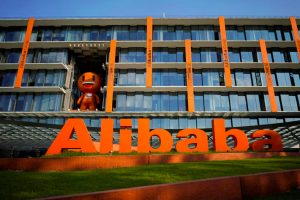Hong Kong was dragged down on Friday by downbeat news from e-commerce giant Aliababa warning of a poor outlook for the firm off the back of disappointing income growth.
The Chinese outfit’s shares tanked more than 10% on an otherwise mixed day for Asia’s stock markets after it revealed net profit had tumbled 81% in the second quarter – and revenue grew less than forecast as it was hit by the impact of slowing economic growth and a government crackdown on the tech sector.
The firm, once the poster child of China’s high-flying private enterprises, also said income growth over the rest of the fiscal year fell short of expectations, adding that certain factors could further impact results including “changes in laws, regulations and [the] regulatory environment” such as those related to privacy and data.
The 10.7% loss in Alibaba’s Hong Kong stock reflected a more than 11% fall in its New York shares and comes after a painful year that has seen the firm in the crosshairs of Beijing’s regulatory drive to rein in companies it thought were growing too powerful.
Also on AF: Alibaba Shares Plunge 10% After Earnings Slump, Slow Growth Warning
With Alibaba a big player on Hong Kong’s Hang Seng Index, the market dropped and other tech firms including Tencent and XD suffered smaller losses.
The Hang Seng Index tumbled 1.07%, or 269.75 points, to 25,049.97. The Shanghai Composite Index added 1.13%, or 39.66 points, to 3,560.37, while the Shenzhen Composite Index on China’s second exchange climbed 1.2%, or 29.41 points, to 2,490.27.
Singapore, Wellington, Taipei, Bangkok and Manila also slipped. But Tokyo climbed as the government announced plans to inject $490 billion into the Japanese economy to kickstart the pandemic recovery.
The benchmark Nikkei 225 index rose 0.50%, or 147.21 points, to 29,745.87. Over the week, it gained 0.5%. The broader Topix index was up 0.44% or 9.01 points at 2,044.53 and added 0.2% from a week before. There were also gains in Shanghai, Sydney, Seoul and Jakarta.
Traders had been given a positive lead from Wall Street, where the S&P 500 and Nasdaq ended at record highs, though the focus remains on surging inflation and growing expectations that central banks will tighten monetary policy soon.
Data this month has shown prices rising at levels not seen for three decades in the United States, 18 years in Canada and 10 years in the United Kingdom owing to soaring energy costs and global supply chain snarls.
Federal Reserve Plans
Finance chiefs in some countries including South Korea and New Zealand have already hiked interest rates, and the Bank of England is expected to follow suit before the end of the year.
But eyes are on the Federal Reserve, which has already announced plans to wind down its vast bond-buying programme. It is now facing increasing pressure to hike borrowing costs as soon as mid-2022.
Oil extended Thursday’s advance after a recent sell-off, with little reaction to the news that China will release some of its reserves following a call by US President Joe Biden to Xi Jinping to help ease a surge in prices that is partly to blame for the inflation spikes.
“The oil market deficit will still remain despite the tapping of reserves and the next big move for prices will most likely depend on the weather,” OANDA’s Edward Moya said.
“Natural gas prices may be the key short-term driver as Russia plays hardball with Europe. Any natural gas shortages will lead to additional crude demand as the scramble for alternative energy sources intensifies.”
MARKETS
Tokyo > Nikkei 225: UP 0.5% at 29,745.87 (close)
Hong Kong > Hang Seng Index: DOWN 1.1% at 25,049.97 (close)
Shanghai > Composite: UP 1.1% at 3,560.37 (close)
New York > Dow: DOWN 0.2% at 35,870.95 (close)
- AFP with additional editing by Sean O’Meara
Read more:
Japan’s Record $490bn Stimulus Bucks Global Tapering Trend
IMF Urges China to Tackle Rising Economic Risks
























